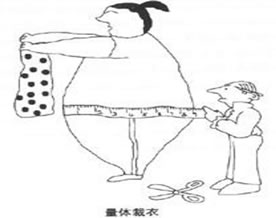英语写作的"七项基本原则"

五、多实少虚原则
原因很简单,写文章还是应该写一些实际的东西,不要空话连篇.这就要求一定要多用实词,少用虚词.我这里所说的虚词就是指那些比较大的词.比如我们说一个很好的时候,不应该之说nice这样空洞的词,应该使用一些诸如generous, humorous, interesting, smart, gentle, warm-hearted, hospital 之类的形象词.再比如:
走出房间,general的词是:walk out of the room
但是小偷走出房间应该说:slip out of the room
小姐走出房间应该说:sail out of the room
小孩走出房间应该说:dance out of the room
老人走出房间应该说:stagger out of the room
所以多用实词,少用虚词,文章将会大放异彩!
六, 多变句式原则
1)加法(串联)
都希望写下很长的句子,像个老外似的,可就是怕写错,怎么办,最保险的写长句的方法就是这些,可以在任何句子之间加and, 但最好是前后的句子又先后关系或者并列关系.比如说:
I enjoy music and he is fond of playing guitar.
如果是二者并列的,我们可以用一个超级句式:
Not only the fur coat is soft, but it is also warm.
其它的短语可以用:
besides, furthermore, likewise, moreover
2)转折(拐弯抹角)
批评某人缺点的时候,我们总习惯先拐弯抹角说说他的优点,然后转入正题,再说缺点,这种方式虽然阴险了点,可毕竟还比较容易让人接受.所以呢,我们说话的时候,只要在要点之前先来点废话,注意二者之间用个专这次就够了.
The car was quite old, yet it was in excellent condition.
The coat was thin, but it was warm.
更多的短语:
despite that, still, however, nevertheless, in spite of, despite, notwithstanding
3)因果(so, so, so)
昨天在街上我看到了一个女孩,然后我主动搭讪,然后我们去咖啡厅,然后我们认识了,然后我们成为了朋友…可见,讲故事的时候我们总要追求先后顺序,先什么,后什么,所以然后这个词就变得很常见了.其实这个词表示的是先后或因果关系!
The snow began to fall, so we went home.
更多短语:
then, therefore, consequently, accordingly, hence, as a result, for this reason, so that
4)失衡句(头重脚轻,或者头轻脚重)
有些人脑袋大,身体小,或者有些人脑袋小,身体大,虽然我们不希望长成这个样子,可如果真的是这样了,也就必然会吸引别人的注意力.文章中如果出现这样的句子,就更会让考官看到你的句子与众不同.其实就是主语从句,表语从句,宾语从句的变形.
举例:This is what I can do.
Whether he can go with us or not is not sure.
同样主语,宾语,表语可以改成如下的复杂成分:
When to go, Why he goes away…
